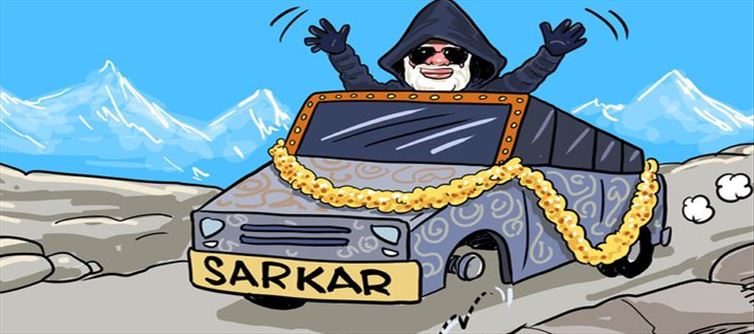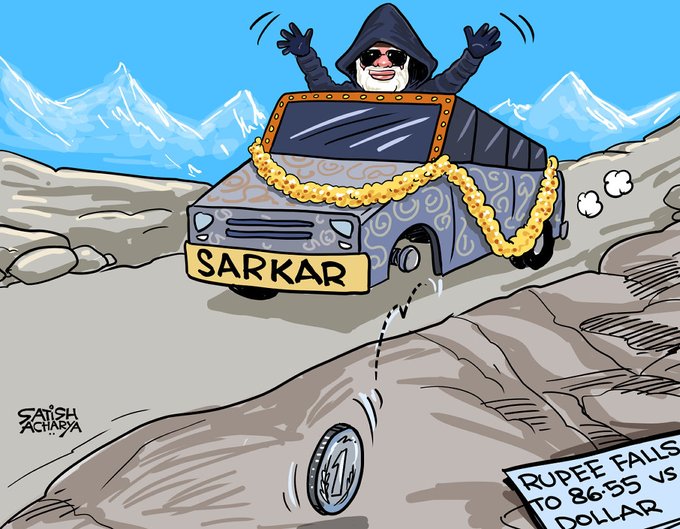
In 2013, when the indian rupee faced a significant fall, the uproar from certain political circles was deafening. At the forefront of this chorus was narendra Modi, then the chief minister of Gujarat. His criticism of the then-government’s handling of the economy was scathing, and his speeches were peppered with rhetoric portraying the rupee’s decline as a national crisis. Modi called the rupee "weak," said it was in the "ICU," and accused the government of losing control over the economy. His fiery words resonated with a frustrated public and became a rallying cry for change.
Fast forward to today, and the rupee is in an even worse state, hitting historic lows and flirting with the 90 mark against the US dollar. But this time, the uproar is conspicuously absent. Modi, now the Prime minister, seems to have lost his voice on the issue that once seemed to matter so much to him. What happened to the concern for India’s economic pride? Why the deafening silence from those who once held the government accountable?
A Tale of Hypocrisy
The rupee’s fall today is much steeper than it was a decade ago, but the reaction from the government and its supporters is a masterclass in selective outrage. In 2013, the rupee's depreciation was portrayed as a symbol of the UPA government’s incompetence. The blame was squarely placed on the then-Prime minister Manmohan Singh, with no acknowledgment of global economic factors like a strengthening US dollar.
Now, in 2025, the tables have turned. The same Modi who accused Singh of ruining the economy seems unbothered by the rupee’s crash under his watch. No ICU metaphors, no dire warnings about foreign powers taking advantage of a weak currency, no fiery speeches filled with economic doomsday predictions. Why? Perhaps because the fall of the rupee no longer serves a political purpose.
Media’s Convenient Amnesia
The media, which once amplified every critical soundbite, has also fallen eerily silent. The same newspapers and tv anchors who declared the rupee’s fall a national disaster in 2013 now bury the news deep inside their pages, if they cover it at all. Instead of asking tough questions, they tread lightly, unwilling to challenge the narrative. The watchdogs of democracy seem to have transformed into lapdogs, prioritizing access over accountability.
The Forgotten Middle Class
The rupee’s collapse is not just a number; it has real consequences for ordinary indians, especially the middle class. Travel, education abroad, imported goods—all are now significantly more expensive. The stock market, once a haven for middle-class savings, has been shaky, and inflation eats away at their purchasing power. Yet, their plight is ignored.
Why? Because the middle class, despite being the backbone of the economy, is not a significant vote bank. With only 2% of indians paying income tax, their electoral clout is negligible. Politicians prefer to focus on populist schemes for larger voting blocs, leaving the middle class to fend for itself.
No Accountability, No Answers
The government’s refusal to address the issue directly is another cause for concern. In 2013, there were at least attempts to explain the rupee’s fall—global factors, oil prices, and economic slowdowns were cited. Whether or not those explanations were convincing, the government engaged with the public. Today, there is only silence. The finance ministry offers no reassurance, and the Prime Minister’s once vocal concern for the rupee has evaporated.
A Call for Consistency
The hypocrisy is glaring. If the rupee’s fall was a crisis in 2013, why is it not a crisis now? If it symbolized economic mismanagement then, what does it symbolize today? Silence is not an answer. The rupee’s decline deserves the same scrutiny and outrage as it did a decade ago, regardless of who is in power.
It is time to demand consistency from leaders, accountability from the media, and fairness for the middle class. The rupee’s fall is not just about numbers; it reflects deeper issues in governance, economic strategy, and the priorities of those in power. And until these are addressed, the silence will speak louder than words ever could.




 click and follow Indiaherald WhatsApp channel
click and follow Indiaherald WhatsApp channel